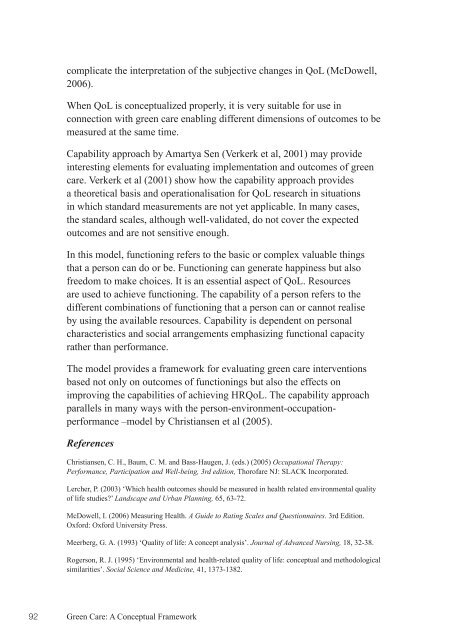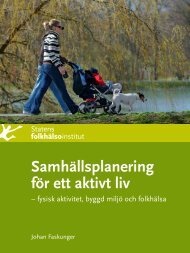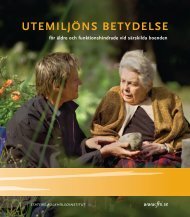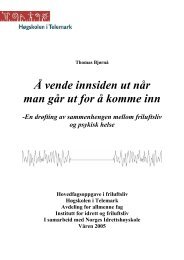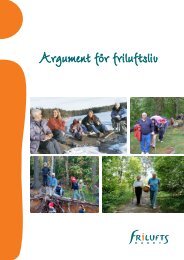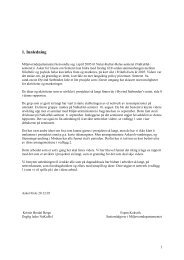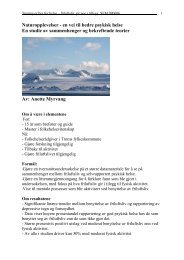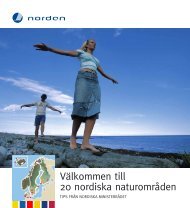Green Care: A Conceptual Framework - Frisk i naturen
Green Care: A Conceptual Framework - Frisk i naturen
Green Care: A Conceptual Framework - Frisk i naturen
You also want an ePaper? Increase the reach of your titles
YUMPU automatically turns print PDFs into web optimized ePapers that Google loves.
complicate the interpretation of the subjective changes in QoL (McDowell,<br />
2006).<br />
When QoL is conceptualized properly, it is very suitable for use in<br />
connection with green care enabling different dimensions of outcomes to be<br />
measured at the same time.<br />
Capability approach by Amartya Sen (Verkerk et al, 2001) may provide<br />
interesting elements for evaluating implementation and outcomes of green<br />
care. Verkerk et al (2001) show how the capability approach provides<br />
a theoretical basis and operationalisation for QoL research in situations<br />
in which standard measurements are not yet applicable. In many cases,<br />
the standard scales, although well-validated, do not cover the expected<br />
outcomes and are not sensitive enough.<br />
In this model, functioning refers to the basic or complex valuable things<br />
that a person can do or be. Functioning can generate happiness but also<br />
freedom to make choices. It is an essential aspect of QoL. Resources<br />
are used to achieve functioning. The capability of a person refers to the<br />
different combinations of functioning that a person can or cannot realise<br />
by using the available resources. Capability is dependent on personal<br />
characteristics and social arrangements emphasizing functional capacity<br />
rather than performance.<br />
The model provides a framework for evaluating green care interventions<br />
based not only on outcomes of functionings but also the effects on<br />
improving the capabilities of achieving HRQoL. The capability approach<br />
parallels in many ways with the person-environment-occupationperformance<br />
–model by Christiansen et al (2005).<br />
References<br />
Christiansen, C. H., Baum, C. M. and Bass-Haugen, J. (eds.) (2005) Occupational Therapy:<br />
Performance, Participation and Well-being, 3rd edition, Thorofare NJ: SLACK Incorporated.<br />
Lercher, P. (2003) ‘Which health outcomes should be measured in health related environmental quality<br />
of life studies?’ Landscape and Urban Planning, 65, 63-72.<br />
McDowell, I. (2006) Measuring Health. A Guide to Rating Scales and Questionnaires. 3rd Edition.<br />
Oxford: Oxford University Press.<br />
Meerberg, G. A. (1993) ‘Quality of life: A concept analysis’. Journal of Advanced Nursing, 18, 32-38.<br />
Rogerson, R. J. (1995) ‘Environmental and health-related quality of life: conceptual and methodological<br />
similarities’. Social Science and Medicine, 41, 1373-1382.<br />
92 <strong>Green</strong> <strong>Care</strong>: A <strong>Conceptual</strong> <strong>Framework</strong>


